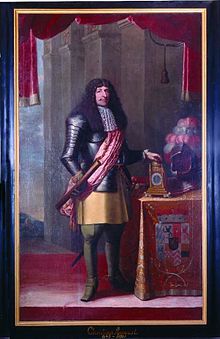Christian August (Pfalz-Sulzbach)
Christian August (born July 26, 1622 in Sulzbach , Upper Palatinate ; † April 23, 1708 ibid) was a Wittelsbach prince , Count Palatine and first Duke of Palatinate-Sulzbach .
Life
Christian August was the eldest son of the Count Palatine and Duke August von Sulzbach (1582–1632) from his marriage to Hedwig (1603–1657), daughter of Duke Johann Adolf von Schleswig-Holstein-Gottorf .
His father made arrangements for a Lutheran and humanistic education for his son at an early stage by having the Silesian nobleman Peter von Sebottendorf draw up an education and curriculum as early as 1628. This included reading the Old and New Testaments in French. He should learn Latin based on the apophthegma of Erasmus of Rotterdam and the writings of the Spanish humanist Juan Luis Vives . Furthermore, Sebottendorf used the writings of the state theorist Giovanni Botero , the historian Francesco Giucciardini and the Flemish humanist Justus Lipsius .
On January 15, 1656, the main settlement in Neuburg took place . This created the Duchy of Neuburg-Sulzbach as an independent, imperial direct principality and at the same time as the last of the Wittelsbach principalities. It comprised the Sulzbach district court with the rule of Breitenstein, the Neuburgian half at the Parkstein-Weiden community office and the Floß care office with the Vohenstrauss court. However, it never had a seat in the Fürstenkolleg, as no official Reichsbelehung had taken place.
In the course of the Neuburg Main Settlement, the Duke also converted to the Catholic Church in 1656, and on this occasion he founded the St. Anna pilgrimage church near Sulzbach . Under his reign the regulation that the subjects should have the denomination of their rulers was abolished and the Simultaneum was introduced. The old regulation previously meant that the Sulzbach population had to change religious denominations seven times.
Christian August was a tolerant ruler. In 1666 he allowed the settlement of Jews . During his reign, Sulzbach became a spiritual center. Significant book printing companies were established across the region . Above all, he is considered to be the initiator of the Sulzbacher Musenhof , the focus of which was Christian Knorr von Rosenroth and which he established with his appointment around 1670.
The grammar school in his hometown Sulzbach-Rosenberg has had his name since 1985 with the Herzog-Christian-August-Gymnasium .
progeny
On April 3, 1649, he married Amalie (1615–1669), daughter of Count Johann VII of Nassau-Siegen and widow of Hermann von Wrangel in Stockholm . Like her husband, she converted to the Catholic Church and the couple had the following children:
- Hedwig (1650-1681)
- ⚭ 1. 1665 Archduke Sigismund Franz of Austria (1630–1665)
- ⚭ 2. 1668 Duke Julius Franz of Saxony-Lauenburg (1641–1689)
- Amalia Sophia Maria Therese (1651–1721), nun in Cologne, St. Maria Monastery in Kupfergasse
- Johann August Hiel (1654–1658)
- Christian Alexander Ferdinand (1656-1657)
- Theodor Eustach (1659–1732), Count Palatine and Duke of Sulzbach
- ⚭ 1692 Princess Marie Eleonore of Hessen-Rheinfels-Rotenburg (1675–1720)
Individual evidence
- ↑ Klaus Jaitner: The Sulzbacher Musenhof in the European history of ideas , in: Johannes Hartmann and Elisabeth Vogel: Eisenerz und Morgenglanz . Amberg 1999, p. 636
- ^ Website of the Historical Lexicon of Bavaria , with mention of the Pilgrimage Foundation
- ↑ cf. on this: Literature archive Sulzbach-Rosenberg (ed.): Christian Knorr von Rosenroth. Poet and scholar at the Sulzbacher Musenhof. Festschrift for the 300th anniversary of death; Sulzbach-Rosenberg 1989, ISBN 3-924350-16-7
- ^ School name. In: hca-gymnasium.de. Retrieved August 18, 2019 .
Web links
- 350 years of the Wittelsbach Principality of Palatinate-Sulzbach
- Digitized prints by Christian August (Pfalz-Sulzbach) in the catalog of the Herzog August Library
| predecessor | Office | successor |
|---|---|---|
|
August (Count Palatine) |
Duke of Pfalz-Sulzbach 1656–1708 |
Theodor Eustach |
| personal data | |
|---|---|
| SURNAME | Christian August |
| BRIEF DESCRIPTION | Count Palatine and first Duke of Pfalz-Sulzbach |
| DATE OF BIRTH | July 26, 1622 |
| PLACE OF BIRTH | Sulzbach , Upper Palatinate |
| DATE OF DEATH | April 23, 1708 |
| Place of death | Sulzbach , Upper Palatinate |


